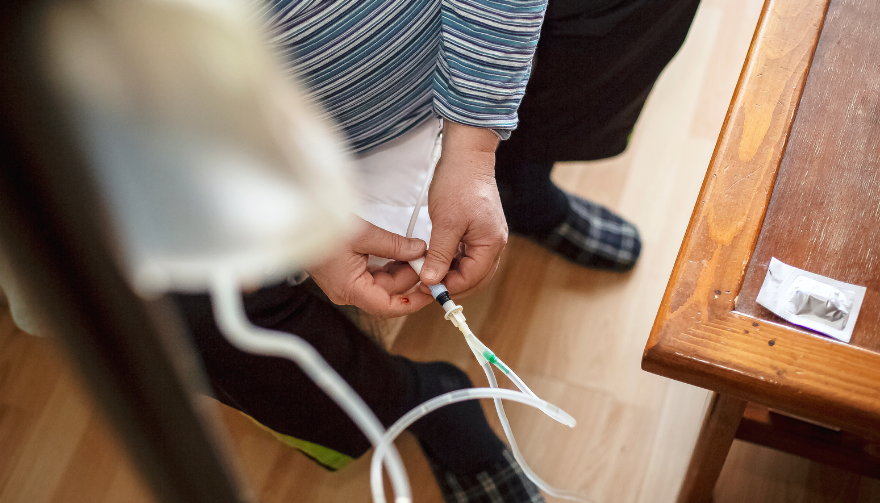Category: Health Tips
The Impact of Kidney Inflammation: Symptoms and Treatment
Our kidneys play a vital role in our bodies, as it filters waste products and excess fluids from our blood circulation. Kidney inflammation can have serious consequences for our health and bring on various signs. In this article, we will explore how kidney inflammation can affect us, including its symptoms, diagnosis and treatment options. What […]
Read MoreAll You Need to Know About Peritoneal Dialysis
Peritoneal dialysis is a viable option for patients whose kidneys are unable to filter wastes and excess fluids from the body. In this article, we will explore the fundamentals of peritoneal dialysis; its purpose, who can benefit from it, its pros and cons, and what to expect while undergoing treatment. How does Peritoneal Dialysis (PD) […]
Read MoreChronic Kidney Disease: Causes & Symptoms
Millions of individuals worldwide suffer from chronic kidney disease (CKD). Yet, it often goes undiagnosed until it progresses to end-stage kidney disease. Like any life-threatening illness/ disease, early detection and treatment can help slow or even stop the progression of this disease.
In this article, we will take a closer look at what chronic kidney disease is, the causes of kidney failure, its signs and symptoms, and how it is diagnosed and treated.
What Is Chronic Kidney Disease?
Chronic kidney disease is a progressive illness in which the kidneys’ functions deteriorate over time, affecting their role in regulating blood pressure, producing hormones, and maintaining a healthy balance of minerals and fluids.
The kidneys, a pair of bean-shaped glands in the lower abdominal cavity, are essential for bodily functions and general wellness. The kidneys are crucial for many causes, including:
► Waste Removal: The kidneys filter waste products from the blood and excrete them from the body as urine. The kidney plays a vital role in removing harmful substances from the body, such as urea, creatinine, and excess electrolytes.
► Blood Pressure Regulation: The kidneys help regulate blood pressure by producing a renin hormone. By increasing the production of angiotensin, a hormone that constricts blood arteries and elevates blood pressure, renin maintains a healthy cardiovascular system.
► Electrolyte Balance: The kidneys regulate the balance of electrolytes in the body, such as phosphorus, potassium, and sodium. This is important for maintaining normal heart and muscle function.
► Red Blood Cell Production: The hormone erythropoietin is manufactured in the kidneys and triggers the bone marrow to produce red blood cells.
► Acid-Base Balance: The kidneys help regulate the body’s acid-base balance by filtering out excess acids and retaining bicarbonate, which acts as a buffer to neutralise acids.
The degree of renal damage and kidney function are used to categorise chronic kidney disease (CKD) into five stages; Stage 1 is the mildest, while stage 5 is end-stage kidney disease (ESKD). When an individual is diagnosed with end-stage kidney disease, it typically requires treatment, such as a kidney transplant or dialysis, to sustain life.
Causes of Chronic Kidney Disease
Hypertension and diabetes are the two leading causes of kidney failure. Still, it can also result from other conditions such as glomerulonephritis (inflammation of the small blood vessels in the kidneys), polycystic kidney disease (an inherited disorder that causes cysts to form in the kidneys), and kidney damage from certain medications or toxins
Symptoms of Kidney Disease
Kidney failure symptoms may be subtle and may not appear until the later stages of the disease. Renal failure is characterised by several symptoms, including:
► Fatigue and weakness
► Swelling in the legs, ankles, or feet
► Shortness of breath
► Nausea and vomiting
► Loss of appetite
► Confusion or difficulty concentrating
► Abnormal heart rhythms
► Muscle cramps and twitching
► Itchy skin or skin rash
► Urinary changes, including decreased urine output or dark-colored urine.
Blood tests to measure waste products like creatinine and blood urea nitrogen, urine tests to measure the quantity of protein in the urine, and imaging tests such as ultrasound or CT scan are commonly used together to diagnose chronic kidney disease.
There are multiple ways to prevent kidney failure, ranging from dietary and lifestyle modifications (like reducing salt intake, smoking cessation, reducing carbohydrate and processed food, and exercising regularly)) to treatment with medication and, in severe cases, undergoing dialysis or a kidney transplant.
CKD risk factors include diabetes, high blood pressure, or a family history of kidney disease. If present, regular medical check-ups and monitoring of the renal function tests, are essential to avoid the need for dialysis or transplantation.
If you suspect you may have kidney disease symptoms, do not hesitate to reach out and contact us for more information.
Read More


